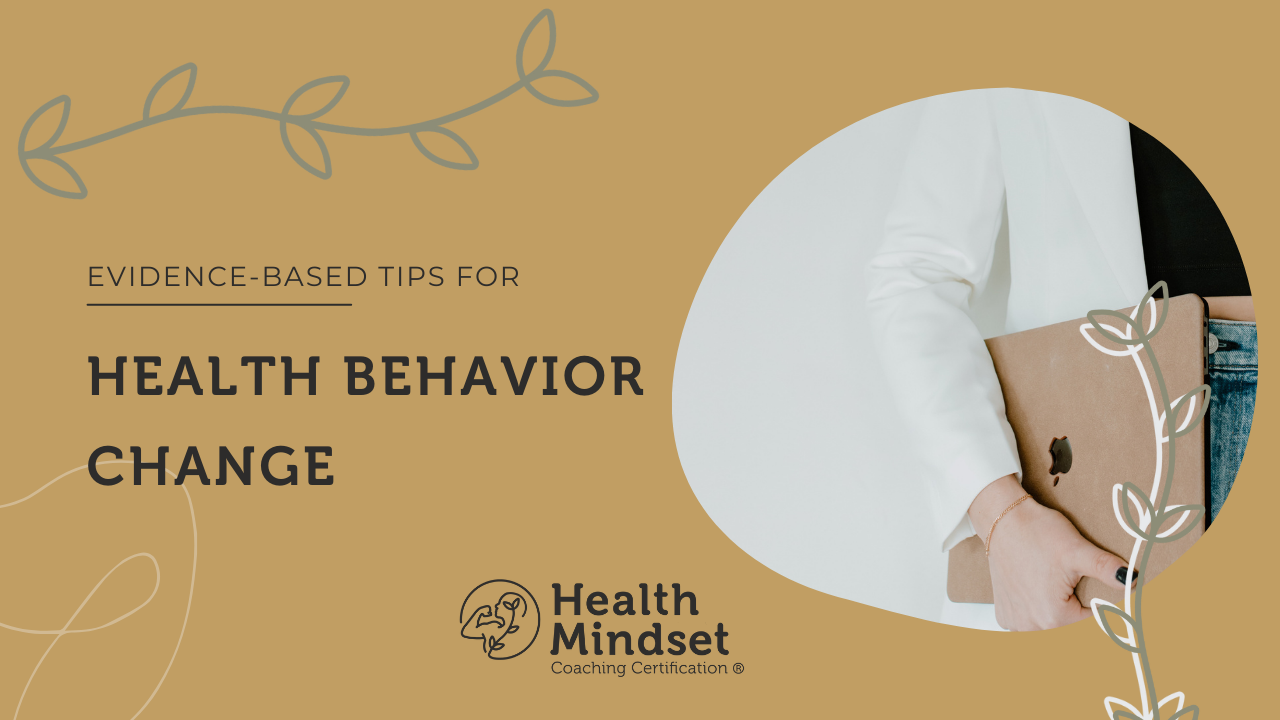The Key to Effective Health Behavior Change: A Guide for Fitness Coaches
Nov 12, 2024
As a fitness coach, you want to give your clients the best chances of sticking to the plan and achieving lasting results, but you may be struggling with this right now because you don't necessarily have all the tools in your toolbox.
But this isn’t your fault. Health and fitness coaches get training and education on things like nutrition and exercise, but not much when it comes to clients' psychology and behavior (aka the things that really matter most when making lifestyle changes!).
Clients struggle to make meaningful and lasting changes if they don't understand their habits, eating patterns, exercise routines, and mindset. They will also have a hard time changing their behaviors if they lack self-efficacy (their ability to stick with their health behaviors even in the face of obstacles), which is another thing you can help them improve.
Changing behavior goes well beyond just following a fitness plan. It requires that your client has a sense of awareness of the actions that need improvement.
If you are trying to help a client create healthy behavior change and develop a growth mindset for lasting results your client first has to develop awareness of their own behavior.
In this post, I'll go over the different models of health promotion and behavior change and dig into the often missing key to creating lasting change.
You can use this post as a starting point for helping your clients improve health-related behaviors, and you can join the waitlist for the next round of the Health Mindset Coaching Certification if you're interested in more in-depth guidance on how you can help your clients adopt healthy habits and make changes that last.
Table of Contents
Understanding Health Behavior
Models of Behavior Change
The Health Belief Model
The Transtheoretical Model (Stages of Change)
Preparing for Behavior Change
Motivation for Behavior Change
Coaching for Behavior Change
Connect with us!

Understanding Health Behavior
When we're talking about health behavior, we're talking about the actions someone takes to maintain, restore, or improve their health.
Everything from eating a nutrient-rich diet to lose weight or avoid weight gain, practicing mindfulness in every aspect of their lives, to managing stress, and embracing a growth mindset falls under the category of health behavior.
As a fitness coach, your goal isn't just to take your clients out of a state of being unhealthy and bring them to a place where they are healthy in the sense that they are not sick.
You want to help your clients OPTIMIZE their health to minimize their risk of things like chronic diseases while having them feel as good as possible. Good in the sense of things like smooth digestion, natural energy, and optimal sleep.
Your client's health behaviors have significant consequences for both the quality and length of their lives, so if their goal is to feel as good and healthy as possible, you'll want to make sure you're guiding them to create healthy behaviors they can sustain throughout their lives.
Changing a person's behavior isn't just about encouraging more physical activity and healthy eating (although those are also important). When we're talking about optimizing our client's health, we're looking at everything from physical health to their mental health.
We want our clients to adopt a mindset where physical activity and healthy eating are automatic things for them, and they are embracing a growth mindset to maintain behavior change because if a client doesn't want to change or they don't want to change for the right reasons, their results will be short-lived.
Models of Behavior Change
There are several research-backed models of behavior change that I teach in the Health Mindset Coaching Certification. Each one has its own merits and can be an effective tool in helping your clients ditch unhealthy behaviors and create behavior change.
The thing that good healthcare professionals, fitness coaches, etc., understand is that just because we may have several clients with the same desired behavior doesn't mean the same approach will work for all of them.
Things like social support, environmental context, previous experiences with behavior change interventions, and the perceived severity of their risk of health issues all play a role in the best approach to take when trying to adopt healthier behaviors.
The Health Belief Model
The Health Belief Model has been around for nearly 75 years and is primarily used for prevention and detection.
This model suggests that a person's belief in a personal threat of an illness or disease will predict their likelihood of adopting a healthy behavior.
It also takes into account how they perceive the benefits of taking action (i.e., adopting healthy behaviors).
If someone doesn't believe they are at risk of negative health outcomes, they are unlikely to attempt to change behavior patterns. Or, if they feel that the healthy behavior you or anyone else is suggesting they adopt is not worth the effort, they are less likely to work toward behavior change.
P.S. This is where intrinsic motivation really comes into play!
But! Once they feel the health outcome is worth the effort, ditching unhealthy behavior becomes easier.
For example, say your client dreads doing any sort of physical activity, but you help them realize that even a short walk after a meal can help regulate blood sugar and improve digestion, and they've been stressing about issues like diabetes that run in their family, and they have been telling you they hate how they feel bloated after every single meal. In that case, they may view physical exercise as being worth it for the improvement of their blood sugar and digestion.
The Transtheoretical Model (Stages of Change)
You may have heard me talk about the stages of change, which is a key component of knowing if your clients are even ready to adopt behavior change.
The Transtheoretical Model suggests that people move through six stages of change: pre-contemplation, contemplation, preparation, action, maintenance, and termination.
Depending on where your client is in the stages of change model will determine how you should approach the discussion about creating change and helping them reach their goals.
Your approach will be extremely different when dealing with a client who doesn't even realize they have unhealthy behaviors vs. when you're dealing with a client who has been working on behavior change for a long time and is now debating whether it's worth it to make these new health behaviors a permanent part of who they are.
Assessing your client's readiness to change behavior patterns is essential to helping them create lasting change.
Preparing for Behavior Change
There's one thing you have to address with every client before you can even attempt to change any health behavior.
Beyond understanding the different behavior change models, there really is a step one for behavior change and cultivating a growth mindset in general: a client's awareness of their own behavior.
Your clients can't change what they don't know needs changing. It's very difficult to help a client adjust their behaviors or do something differently if they don't even realize that it's something that needs adjusting.
It's great if they come to you saying they want to get in shape or fix their eating behaviors, but without understanding what that looks like and what needs to happen, what needs to change in their life and environment to be more conducive towards that goal they won't get very far.
Most of the problems that your clients have really aren't problems at all. They're actually just a lack of awareness. Once you help clients become more aware of what’s going on, you can help them uncover the real reason they are struggling to stick to the plan and see results.
Motivation for Behavior Change
I already alluded to this above, but the type of motivation your client has is a key component of successful behavior change.
You'll often hear me talk about the importance of intrinsic motivation, and that's because it's all fine and dandy if your client wants to lose weight for their wedding day, but if they want to create long-term change and not just go back to eating a poor diet the day after the wedding, there has to be a deeper sense of motivation.
If you aren't familiar with the different types of motivation, I highly recommend you check out this blog post on how to motivate your clients.
But if you want to get a deeper understanding of the different types of motivation (because there's more to it than just intrinsic and extrinsic motivation), you'll want to join the waitlist for the next round of the Health Mindset Coaching Certification (plus I'll send you five free lessons to get you started right away!).
I have a module inside the certification where I do a deep dive into different types of motivation and how you can help your clients shift their mindset and motivation to give them the best shot at sustained behavior change.
Coaching for Behavior Change
Health behavior change is a complex and dynamic process that involves multiple factors, including understanding your client's individual characteristics, social and environmental factors, and existing healthy behaviors.
Understanding the theories of behavior change and the strategies for changing health behaviors can help you develop effective health promotion protocols.
Encouraging health behavior change with your clients requires a comprehensive and personalized approach that addresses the physical, emotional, and social aspects of behavior change, which is why the cookie-cutter methods many clients have tried before coming to you haven't worked.
Successful behavior change requires a combination of motivation, self-regulation, and environmental support. That support should come from friends and family, but it also comes from you! Check out my G.R.O.W. model for more on that.
If you're interested in learning how to help your client adopt healthy behaviors that they will stick to, you should check out the Health Mindset Coaching Certification.
It's your opportunity to learn how to help your clients tackle all-or-nothing thinking, overcome self-sabotage, develop self-control, and increase motivation and follow-through (meaning no more getting ghosted on check-in day).
This 13-week program will help you develop the skills to effectively help your clients stick to the plan, stick with you, and achieve long-term success in their health and fitness goals.
Join the waitlist here, and you'll get immediate access to some free primer materials to get you started!
Connect with us!
Email: [email protected]





